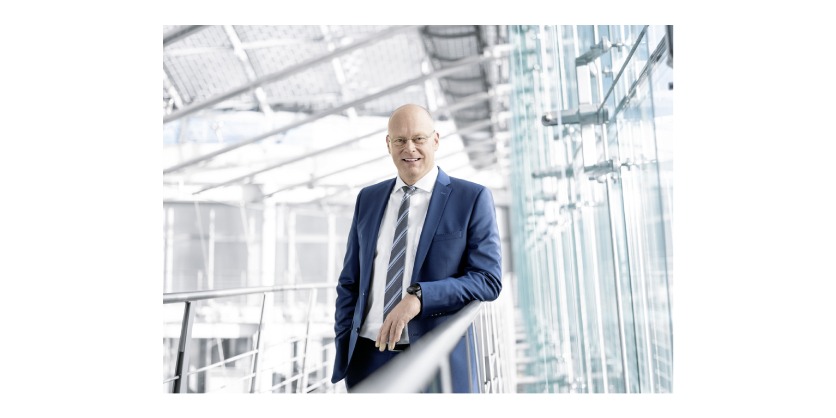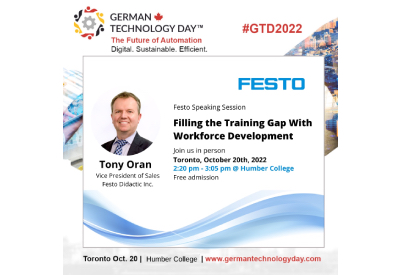Festo Sees Good Growth Prospects
April 24, 2024

Automation as Enabler for Energy Transition and Climate Protection
After years of strong growth, 2023 was a year of consolidation. Turnover was just below the previous year’s level (- 4.3% to around 3.65 billion euros). Festo continued to invest heavily in research and development and the expansion of regional market supply. The company sees good opportunities for growth again in the medium term. The automation of future markets, but also the qualification of the specialists required for this, offers Festo great potential for sustainable growth in the Automation and Didactic business. This includes segments such as battery and electric vehicles, green hydrogen and the semicon industry.
Business year 2023
The Festo Group recorded an economically solid year in 2023 with a satisfactory result. Sales fell slightly to 3.65 billion euros compared to the previous year (3.81 billion euros).
Uncertainty in the global economy put the brakes on higher investments by customers in mechanical and plant engineering in almost all sectors and regions, particularly in Asia and North America. The electronics industry, a strong growth driver for the global economy and also for Festo, also stuttered temporarily after a long boom phase in 2023. The digital business and the technical education sector with the Didactic division developed positively.
Festo invested 7.7% of its turnover in research and development last year. The number of employees at the end of 2023 was around 20,600 (previous year: 20,800) – of which 8,400 were employed in Germany and around 12,200 abroad.
Resilient supply chains: Local for local strategy
The realignment of the global footprint “Local for local” is the response of Festo to new global conditions. Festo is focusing on increasing the localization of its production and customer-specific development close to the markets to ensure optimal supply to customers with short delivery times and high product availability. This also involves shortening transport routes and value chains, making them more resilient and minimizing emissions.
By expanding the Business Regions in North and South America and India, the company aims to tap into the huge growth potential in these markets even faster. “We are focusing on increasing regionalization. In addition to China, India as well as North and South America are becoming increasingly important to us as growth markets. However, we also want to remain strong for our customers in Europe,” said Thomas Böck, Chairman of the Management Board.

A new plant in India close to the main Indian site in Bangalore will create the conditions for further local growth in the Indian market over the next few years and help to secure the supply chain and supply for the entire Asian market.
With the new production site in Manisa, Turkey, Festo is further expanding its regional supply for the European markets. A new logistics building for the Global Production Center Rohrbach in Saarland is being built in Germany. “We are continuing to invest in our competitiveness, new technologies and automation concepts also at our high-tech locations in Germany, particularly for the production of new products. For example, we are producing one of our blockbuster innovations, the new VTUX valve terminal, at our technology plant Scharnhausen and our new ELGD electric actuator at the Rohrbach site,” explained Thomas Böck.
Sustainability and digitalization as drivers of innovation and growth
Festo sets standards in industrial automation technology and technical education and contributes to the sustainable development of the environment, economy and society. Festo has anchored this in its holistic BlueWorld approach and is presenting its trade fair highlights for 2024 at this year’s Hannover Messe.
Sustainability and the climate-friendly transformation of manufacturing are becoming the most important task along the entire value chain. Festo supports the industry on its way into the net zero era. The focus is always on the most efficient and productive solution for motion tasks in industrial production.
“With our broad technological positioning in pneumatic and electrical automation technology and the qualification of specialists, we can provide our customers with comprehensive support in the industrial transformation. We will continue to grow and open up new markets with a focus on sustainability, digitalization and AI. Future industries with great potential such as battery production or green hydrogen and new fields of technology and job profiles in the field of bio-mechatronics offer us promising prospects for sustainable growth,” emphasized Thomas Böck.
More Information
Related Story
The Festo Group
Festo is an independent family-owned company in the field of pneumatic and electrical automation technology. Headquartered in Esslingen a.N., Germany, the company has been a driving force in automation for over 60 years and has developed into the world’s leading provider of technical education and training. Around the world, 300,000 customers rely on Festo’s pneumatic and electric drive solutions in factory and process automation.




